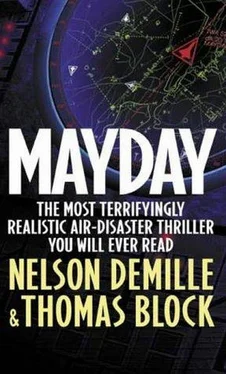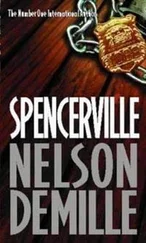Nelson DeMille - Mayday
Здесь есть возможность читать онлайн «Nelson DeMille - Mayday» весь текст электронной книги совершенно бесплатно (целиком полную версию без сокращений). В некоторых случаях можно слушать аудио, скачать через торрент в формате fb2 и присутствует краткое содержание. Жанр: Триллер, на английском языке. Описание произведения, (предисловие) а так же отзывы посетителей доступны на портале библиотеки ЛибКат.
- Название:Mayday
- Автор:
- Жанр:
- Год:неизвестен
- ISBN:нет данных
- Рейтинг книги:4 / 5. Голосов: 1
-
Избранное:Добавить в избранное
- Отзывы:
-
Ваша оценка:
- 80
- 1
- 2
- 3
- 4
- 5
Mayday: краткое содержание, описание и аннотация
Предлагаем к чтению аннотацию, описание, краткое содержание или предисловие (зависит от того, что написал сам автор книги «Mayday»). Если вы не нашли необходимую информацию о книге — напишите в комментариях, мы постараемся отыскать её.
Mayday — читать онлайн бесплатно полную книгу (весь текст) целиком
Ниже представлен текст книги, разбитый по страницам. Система сохранения места последней прочитанной страницы, позволяет с удобством читать онлайн бесплатно книгу «Mayday», без необходимости каждый раз заново искать на чём Вы остановились. Поставьте закладку, и сможете в любой момент перейти на страницу, на которой закончили чтение.
Интервал:
Закладка:
Sloan had let enough time slip by. “Admiral?”
Hennings looked at Sloan. If he didn’t dislike the man personally-if the suggestion had come from a more morally courageous officer-then it would be easier to say yes. Hennings cleared his throat. “Let’s give it ten minutes more.”
“Five.”
“Seven.”
Sloan reached out and set the countdown clock for seven minutes. He hit the start button.
Hennings nodded. Commander Sloan was a man who wasted neither words nor time. “Can you be sure Matos will…”
“We’ll know soon enough. But I’d be surprised if he didn’t come to the same conclusions himself. I understand Matos better than he understands himself, though I’ve hardly spoken to the man. Matos wants to be part of the team.” He sat down and began writing. “I’m drafting a message to him, and I want you to help me with it. What we say and how we say it will be very important.”
“Well, Commander, if you’ve convinced me, you can convince that unfortunate pilot. You need no help from me in that direction.” Randolf Hennings turned his back to Sloan and opened the blackout shade over the porthole. He stared out at the sea. He wondered what fates had conspired against him to make him do such a thing so late in life. The good years, the honest years, all seemed to count for very little when stacked up against this. He thought of the Straton. How many people onboard? Three hundred? Surely they were dead already. But now their fate would never be known to their families. Randolf Hennings had consigned them to their grave. They would lie there in the ocean where so many of his friends already lay, where he himself wished he could lie.
Jerry Brewster stood idly in the small communications room of Trans-United Operations at San Francisco International Airport, his hands in his pockets. He waited for the 500-millibar Pacific weather chart to finish printing. Working in this room was the only part of his job as dispatcher’s aide that he really disliked. The lights were too bright, the noises too loud, and the chemical smells from the color-reproduction-enhancement machines hung heavily in the stagnant air.
The new chart was finished printing. Brewster waited impatiently for it to dry before he pulled it out of the machine. Jack Miller had requested the update on mid-altitude temperatures, and Brewster wanted to get the data to him before lunch. Brewster made it a point to drop everything else whenever Miller asked for something. Brewster liked the old man; Miller was always available for advice and training.
Brewster reached down and carefully pulled the newly printed chart off the roller and held it up. He walked toward the door with the map suspended from two fingers, just to be sure he didn’t smudge the still-damp color ink. A bell rang behind him. The tiny sound carried from the far corner of the room above the other electronic noises. Brewster paused. It was the data-link’s alerting bell. He listened. The screen was displaying a new message, and even from this far away, he could see that it was unusually short-a few letters or numbers. Brewster knew what that meant. Another malfunction. More gibberish. A segment of some half-digested intracompany transmissions. He watched from a distance to see if the screen would update.
After spending a small fortune to equip the entire Trans-United fleet with this electronic marvel, the data-link communications network was still subject to “technical difficulties,” as they called it. Brewster called it screwed up. Garbled messages. Phrases or letters that repeated for screen after screen. Misaligned or inverted columns of data. It was almost funny, except that they were forever calling the system engineers to troubleshoot the damned thing. Fortunately, it was used only for routine and nonessential communications-meal problems, crew scheduling, passenger connections, routine weather and position updates. When it worked fine, it was fine, and when it didn’t, you ignored it. Brewster ignored it.
He stepped toward the door. The chemicals in the room stung his nostrils and made his eyes water. He wanted to get into the cleaner air of the dispatcher’s office, away from the irritants. He opened the door, then hesitated. Monitoring
the data-link was one of his responsibilities. All right, damn it. He slammed the door shut, crossed the room and stood in front of the screen. He read the typed message: SOS
That was all it said. Nothing else. No identity code, no transmission address. Brewster was puzzled, annoyed. What in hell’s name is this? A prank? A joke? No airline pilot in the world would seriously send an SOS. It was archaic, dating from the days of steamships. It was the equivalent of someone reporting a rape in progress by saying, “Maiden in distress.” Who could take that seriously?
Brewster rolled up the weather chart and tucked it under his arm. He stared at the machine in front of him. No, an airline pilot in trouble would transmit a Mayday message on a specific emergency channel using any one of his four radios. He would not send an ancient message on an electronic toy. And even if the impossible had happened and all four radios were malfunctioning, and a pilot resorted to the data-link, then he would send a full message with identifying code. This, then, was either a malfunction in the machine or some pilot’s idea of a joke. A very bad joke. And this pilot knew that his joke would go no further than the Trans-United communications room.
Brewster realized that the joke was aimed at him, and that made him angry. He pressed the print button, then yanked a copy of the message out of the machine and held it in his hand.
SOS
Idiots. It would serve them right if he reported them. He didn’t know if they could trace which of their flights had sent the anonymous message. It was a stupid, irresponsible thing to do, and the pilot who sent it would be in trouble if they could trace it. Then again, it might only be a malfunction. Why get involved? If he reported it, he’d get a bad reputation with the flight crews. That, somehow, might affect his promotion. Miller had always told him to cover for the flight crews. It would pay off. He was glad Evans hadn’t seen the message. He crumpled the data-link’s message and threw it in the trash can and left the room.
Jack Miller saw Brewster walk out of the communications room. “Jerry, can you get that mid-altitude stuff to me soon?”
Brewster looked across the room. “Sure, Mr. Miller. Just a few minutes.” He glanced at the wall clock. Three minutes to twelve. They would both be late for lunch. He unrolled the chart on his desk, weighted it down at the corners, then picked up a pencil and began transcribing pertinent temperatures onto a blank sheet of paper.
John Berry stared at the rotary code selector on the data-link. The thing to do, he decided, was to change codes and send again. A longer message this time. That impulsive SOS had been too brief, enigmatic, he realized. He looked around the cockpit for code books but realized that, even if there had been any, they had probably been sucked out. He would have to try each channel, transmit a complete message, wait for a reply, and if there was none, go on to the next channel. Somewhere, the counterpart to this machine would print. He’d begin monitoring each channel again after he’d transmitted on all of them. It was a shotgun approach, but it was far better than waiting. The urge to hit the key was getting the better of him. “I think I’m going to try another channel. What do you think?”
Sharon Crandall looked at the blank video screen. “Wait a minute or two. I remember that the pilots sometimes waited ten minutes or more for a reply.”
“Why?”
“Well, they don’t send anything important on it. They just want it so they can leave a message in the communications room-for the record.”
Читать дальшеИнтервал:
Закладка:
Похожие книги на «Mayday»
Представляем Вашему вниманию похожие книги на «Mayday» списком для выбора. Мы отобрали схожую по названию и смыслу литературу в надежде предоставить читателям больше вариантов отыскать новые, интересные, ещё непрочитанные произведения.
Обсуждение, отзывы о книге «Mayday» и просто собственные мнения читателей. Оставьте ваши комментарии, напишите, что Вы думаете о произведении, его смысле или главных героях. Укажите что конкретно понравилось, а что нет, и почему Вы так считаете.












